The Checker Maven
The World's Most Widely Read Checkers and Draughts Publication
Bob Newell, Editor-in-Chief
Published every Saturday morning in Honolulu, Hawai`i
Noticing missing images? An explanation is here.
Better Than First

What can be better than first? You'll know the answer when you solve this delightful miniature by R. Holding.
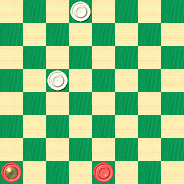
BLACK
Black to Play and Win
B:W31,19:BK4,2.
Can you finish "better than first"? Win the prize by clicking on Read More for the solution and a more detailed explanation of today's theme. (As with most miniatures, we recommend you try to "sight solve" without moving pieces on a board, as a way to develop visualization skills.)![]()
Different Strokes

Normally, on the first Saturday of the month we present one or more "speed" problems, in which you get to race against our unforgiving Javascript clock. We're going to break the routine this month, and from time to time in the future, to present a "stroke" problem instead.
Our large and varied readership, predictably, has large and varied tastes. Some people love speed problems, while others don't; and the same is true of stroke problems, hard problems and easy problems, and on and on.
Presenting variety, and something for everyone at least from time to time, are our goals in presenting our weekly column. So, let's mix things up with a stroke problem that is without any doubt on the easier side.... after all, it's the beginning of March, and in the U.S. at least we'd best be thinking about working on income tax returns.... we do need a bit of a break from time to time.
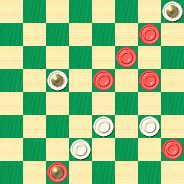
WHITE
White to Play and Win
W:WK4,K14,23,24,26:B8,11,15,16,28,K30.
By all means, don't stroke out if you can't find the solution! Instead, click on Read More for instant relief.![]()
Ace in the Hole
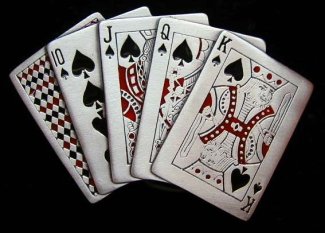
Today we bring you a checker problem that's a little bit easier than some others; it's called "The Ace in the Hole" and is by E. A. Jones. It's really more in the nature of a study or a lesson.
In the position below, forces are even, but the Black king seriously threatens the two White men. To get a draw, White will indeed need an "ace in the hole." If you were a betting person, which side would you take?
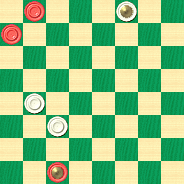
WHITE
White to Play and Draw
W:WK3,17,22:B1,5,K30.
Find out for yourself by solving the problem; is there an Ace in the hole or just a losing low card? A sure bet, though, is clicking on Read More; that's guaranteed to bring you the answers.![]()
Always Read the Fine Print

Preparing articles for our ongoing Checker School series is something we find fascinating, if a bit time-consuming; the hours rush by almost unnoticed. We first find an interesting classic position, usually, as is the case today, from Boland's Famous Positions in the Game of Checkers. Then we work through the position, games, and notes, knowing that if we ourselves can understand the play, the average checkerist will easily do so as well. Finally we check the solutions with the computer--- interesting discoveries are often made that way--- and add our own explanatory notes, amplifying on those things which Mr. Boland found obvious but we, with our far lesser skills, did not.
The offering below is one of those in which you really must read "the fine print" to benefit fully. Mr. Boland's notes were a bit less complete than usual, and there is much worthwhile play and answers to puzzling questions in the variants and branches. Let's look at the problem:
BLACK

WHITE
White to Play and Win
W:W29,14,K2:B8,5,1.
White clearly has the upper hand, but how to stop the Black man on 8 from crowning and evening things up--- without releasing the men in the double corner? Finesses abound in this position and it takes precise play to gain the win.
Solve it yourself, and then be sure to read the fine print, easily accessible by clicking on Read More.![]()
The Block Game

It's been a little while since we searched our admittedly disordered and dusty library for a Tom Wiswell gem, and we've frankly missed the pleasure and enjoyment that his problems infallibly deliver. Finally, this week we did a little reorganizing of our offices, and we happily came across a fine (and long-overdue) example of Mr. Wiswell's incomparable art.
Here, then, is a situation which is based on actual play.
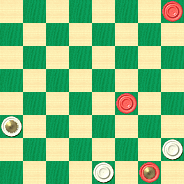
WHITE
White to Play and Win
W:WK21,28,31:B4,19,K32.
The title of our article, which is congruent with Mr. Wiswell's title for the problem, is a pretty obvious hint. But nonetheless, the problem isn't necessarily all that easy.
Spend a little time trying to stack up the solution, but if your mental processes are blocked, clicking on Read More will cause the answers to tumble into your lap.![]()
Two Little Cuties

For our February speed problem offerings, we present two little cuties; a pair of rather easy problems with charming solutions, at least in our humble opinion. We hope you agree. Give them a try; but remember, our relentless timer won't allow you to solve them at a crawl! Fifteen seconds each is all the time you have.
Speed Problem One (rather easy)
Speed Problem Two (easy enough)
However, if you don't solve them in time there is no need to do a diaper change--- clicking on Read More will bring you the solutions without fuss, muss, or mess.![]()
Beeswax Block Buster

The one and only Willie Ryan, checker great, showman, and all-around character, would have been 100 years old this month, we're told. Who knows what he might have added to his many accomplishments had he not passed on far too soon? But in any event, in celebration of this milestone anniversary, we continue our series from what is arguably Willie's best book, Tricks Traps & Shots of the Checkerboard with an entry Willie calls Beeswax Block Buster. Here's what Willie had to say on the subject, way back in 1950.
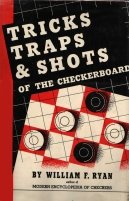
"Early in my checkered career I took a strong fancy to the Old Paraffin opening, developing much new play on it, and with it defeating many prominent stars of the board. Eventually, my contemporaries got onto it, and I dropped the opening from my repertoire. Here is one Beeswax ambush that I used with wide and telling effect:
11-15 24-20 8-11 27-24---A 3-8 23-19 9-13---B 26-23 6-9---C 23-18 1-6 31-27 9-14 18-9 5-14 forming the diagram.
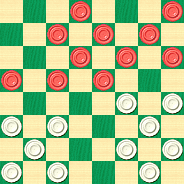
WHITE
White to Play and Win
W:W19,20,21,22,24,25,27,28,29,30,32:B2,4,6,7,8,10,11,12,13,14,15.
A---Forms the Old Paraffin opening, nicknamed the Beeswax. When properly met, it is somewhat weak for white, though drawable.
B---If 9-14 is tried, continue with 22-17, 5-9, 26-23; now 1-5 is drawable. If 15-18 is taken, it can be nailed neatly by 19-15*, 18-27, 32-23, 11-27, 20-16, 12-19, 24-15, 10-19, 17-3, 27-32, 3-12, and white wins by stealing the piece on square 19.
C---This is where black goes wrong. The only move to draw is: 15-18*, 22-15,11-27, 32-23, 6-9, 25-22, 9-14; now 22-18 or 31-26 will draw."
But don't get "waxed" yourself! Try the problem and then click on Read More for a honey of a solution.![]()
A Midnight Encounter

Public Domain
A reader recently asked us if we had a bibliography of checker-related fiction; we didn't, and so we decided to research the topic a bit. It was an interesting exercise; on the internet, we found out about Checkers restaurants, auto parts, taxicabs, hockey teams, and much more, but disappointingly little checker-related fiction.
Of course, there's the Sliders T4 story, certainly the best modern example. And we found references to a few more stories in old fiction magazines: Altruism and Checkers, by Jessie Bartlett Davis, in Poker Chips, #4, September 1896; She Played Checkers, by Sam Allison, in Western Action, Vol. 19, #6, May 1956; Back to Checkers, by Edward Leonard, in Western Story Magazine, Vol. 37, #1, August 25, 1923; and The Checkers Match by 'Gepruitt', found on Blogit, which will cost you about ten dollars for an access subscription (it appears however to be no longer available). Checkers, the novel by John Marsden, is about a dog, not our game of checkers. In addition, we found the Chess N Checkers Restaurant in Allentown, Pennsylvania, hardly fiction, but a place we really must visit some day!
Still, wanting to give you a story to read and a couple of problems to boot, we dug through our own collection and found our single item of checker fiction, a classic short piece called A Midnight Encounter, attributed only to an author named 'Martin'. We hope you enjoy the story and the problems contained therein.
The game of checkers, to one who can comprehend its deeper mysteries, is one of the highest intellectual amusements. In my own estimation it occupies the first place, and chess owes its superior reputation to the complexity of its manceuvers rather than its opportunities for scientific play. But my intention is not to write a panegyric upon my favorite game, but to narrate a most singular event, which made an impression upon my mind that many years have failed to efface.
At the time of this occurrence I was about twenty, and enthusiastically fond of checkers, in which I had attained such proficiency as to conquer all players in my own New England village. A signal victory over an old sea-captain, who alone disputed my supremacy, determined me to make a journey to England and cultivate my talents under the instructions of the London masters. That I did not carry out this design is owing to the following remarkable adventure:
A short time before my intended departure, I was seated in an old country inn on one of the dullest and rainiest days it was ever my fortune to see. I had been playing checkers with mine host, but found him such a mere tyro, that there was no sport in beating him. I therefore dismissed him and proceeded to solve a problem of Sturges; but the old master of checkers had constructed so difficult a position that I could see no solution to it; but I scorned to refer to the book for assistance. Suddenly happening to look up, I perceived a tall old man gazing upon me with an air of triumph. Seating himself opposite to me, he solved the problem with a few simple moves, and offered me the choice of men.
I looked at him with some surprise, and beheld a really handsome man, although much beyond the prime of life, with a grave, studious sweetness of look. I moved 11 to 15 and the struggle commenced. The game occupied nearly an hour, for I was determined to do my best against this strange antagonist, and played with great deliberation. He moved apparently without a moment's thought, but so skillfully, that in several instances only the greatest concentration of my power enabled me to save my game. At length the following position was brought about:
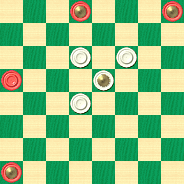
WHITE (Stranger)
White to Play and Win
W:W10,11,K15,18:BK2,K4,13,K29.
Here, it being my antagonist's turn to move, he uttered a low, musical laugh and said: "Sir, you have played this game very prettily, but you will now lose every one of your pieces in just eight moves." Of course he was right and I was beaten.
We fell to conversation upon the game, when the stranger related anecdotes and displayed problems that filled me with amazement. The colloquy was so interesting that I should never have desired it to cease, had not the stranger broken off, exclaiming: "Favor me, sir, with one more game, for my time is short, and I have not played for many years."
Again we engaged. The game was most absorbing, and I had strong hopes of victory. I was surprised at myself, and my adversary no longer played with the careless rapidity of the former game. With beating heart I sternly determined that I would win, if any skill would enable me to do so. At length this was the position:

BLACK (Stranger)
Black to Play and Win
B:W32,29,K16,K13,K12,K5:B27,K23,22,K15,6,K3.
Here, considering my superiority in kings, I thought myself sure of victory; but my rival, whose turn it was to play, said mildly. "You lose every one of your pieces, sir, in just nine moves."
The nine moves followed, and I again yielded to superior skill. I asked the name of the stranger.
"Joshua Sturges, friend. Farewell, with thanks."
He was gone with the first streak of dawn, and I gave up my voyage to England and my game of checkers.
But this need not be the end for you; clicking on Read More will show you the solutions to the problems.![]()
Easing Into The New Year

The holidays have ended, leaving us perhaps a bit weary from all the merry-making and festivities. And so, we'll start the year out with a pair of speed problems taken from actual play, that will give us some entertainment without taxing our tired heads too terribly much. We rate both problems as "easy" but in fact they are most likely "very easy." Still, in the spirit of post-holiday rest, we'll allow a full 15 seconds for each and go "easy" on you.
January Speed Problem #1 (easy)
January Speed Problem #2 (easy)
If somehow you find this all just too much for so early in the year, you can always click on Read More to clear things up at once.![]()
Marvin's New Year's Eve Exhibition

Marvin J. Mavin, the famous captain of the National Checker League's Detroit Doublejumpers, was in Colorado Springs, Colorado, for a New Year's Eve exhibition match with the Colorado Springs Cross Stars, a top team in the AAA Pacific Checker League. The match was a benefit fund-raiser for disadvantaged youth and Marvin took great pride in taking part.


Robby "The Rocket" Murry and Marvin J. Mavin
Marvin, playing first board for the Doublejumpers, was pitted against the Cross Star's Captain, Robby "The Rocket" Murry. After a friendly handshake and a short exchange of pleasantries, the game began, and played out as follows.
| Black | Robby "The Rocket" Murry |
| White | Marvin J. Mavin |
| 9-13 | 21-17 |
| 11-15 | 25-21 |
| 8-11 | 17-14 |
| 10-17 | 21-14 |
| 6-10 | 22-17 |
| 13-22 | 26-17 |
| 15-18 | 24-20 |
| 3-8 | 29-25 |
| 1-6 | 28-24 |
| 18-22 | 25-18 |
| 11-16 | 20-11 |
| 8-22 | 32-28 |
| 4-8 | 24-20 |
| 6-9 | 28-24 |
| 9-18 | 23-14 |
| 8-11 | 27-23 |
| 2-6 | 23-18 |
| 10-15 | 17-13 |
| 22-25 | 30-21 |
| 15-22 | 24-19 |
| 22-25 | 31-26 |
| 25-30 | 26-22 |
| 30-26 |
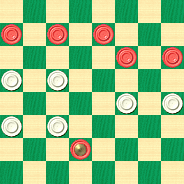
WHITE
White to Play and Draw
W:W13,14,19,20,21,22:B5,6,7,11,12,K26.
It seems that our hero Marvin has once again managed to get himself into trouble, with The Rocket's king behind Marvin's men and seriously threatening them. The big crowd at the sports arena, though obviously partisans of their home town player, had come to see Marvin play, and was, to say the least, surprised. After all, though The Rocket was a strong AAA player, he wasn't a major league star like Marvin.
There was almost dead silence as Marvin considered his move. Marvin, characteristically, was fidgeting in his chair and muttering to himself. What exactly he was saying couldn't quite be made out by the crowd, although a few of the fans in attendance thought they heard the phrases "some New Year's Eve this is gonna be" and "I need a beer."
What would you play in this position? Match wits with Marvin, and then click on Read More for the rest of the story.
The Checker Maven sends its best New Year's wishes to all of our readers!![]()
The Checker Maven is produced at editorial offices in Honolulu, Hawai`i, as a completely non-commercial public service from which no income is obtained or sought. Original material is Copyright © 2004-2026 Avi Gobbler Publishing. Other material is public domain, AI generated, as attributed, or licensed under CC1, CC2, CC3 or CC4. Information presented on this site is offered as-is, at no cost, and bears no express or implied warranty as to accuracy or usability. You agree that you use such information entirely at your own risk. No liabilities of any kind under any legal theory whatsoever are accepted. The Checker Maven is dedicated to the memory of Mr. Bob Newell, Sr.

